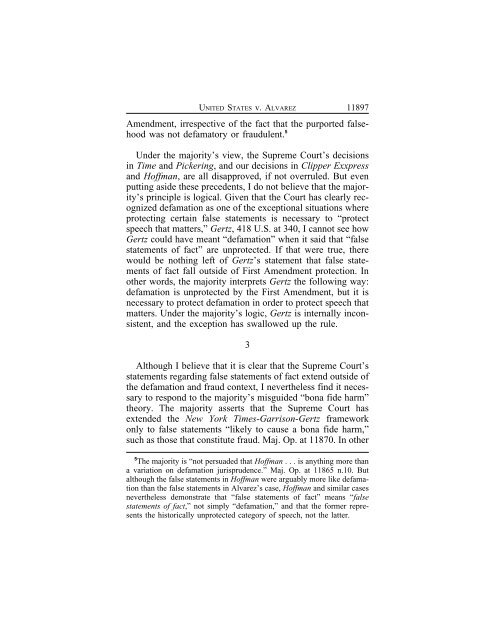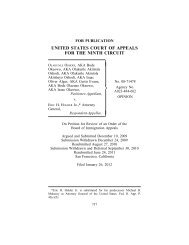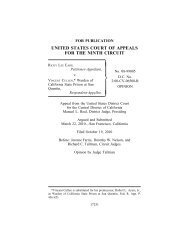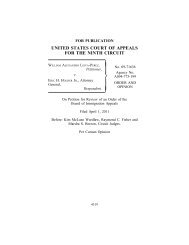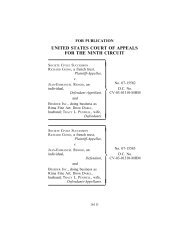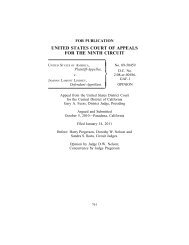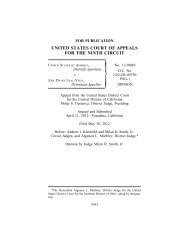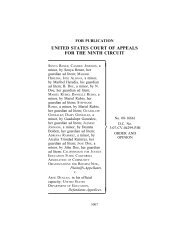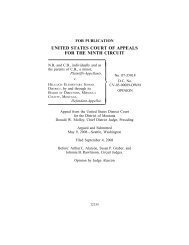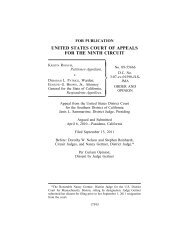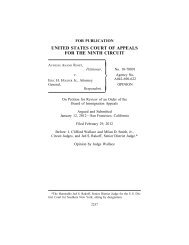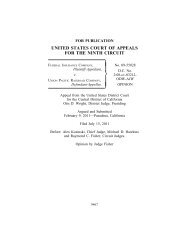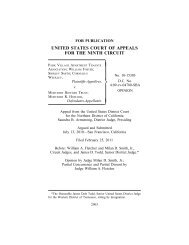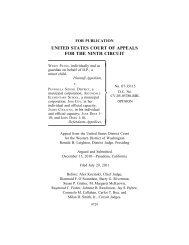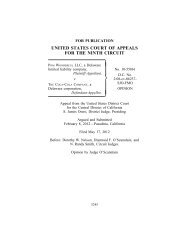USA v. Xavier Alvarez - Ninth Circuit Court of Appeals
USA v. Xavier Alvarez - Ninth Circuit Court of Appeals
USA v. Xavier Alvarez - Ninth Circuit Court of Appeals
Create successful ePaper yourself
Turn your PDF publications into a flip-book with our unique Google optimized e-Paper software.
UNITED STATES v. ALVAREZ<br />
Amendment, irrespective <strong>of</strong> the fact that the purported falsehood<br />
was not defamatory or fraudulent. 5<br />
Under the majority’s view, the Supreme <strong>Court</strong>’s decisions<br />
in Time and Pickering, and our decisions in Clipper Exxpress<br />
and H<strong>of</strong>fman, are all disapproved, if not overruled. But even<br />
putting aside these precedents, I do not believe that the majority’s<br />
principle is logical. Given that the <strong>Court</strong> has clearly recognized<br />
defamation as one <strong>of</strong> the exceptional situations where<br />
protecting certain false statements is necessary to “protect<br />
speech that matters,” Gertz, 418 U.S. at 340, I cannot see how<br />
Gertz could have meant “defamation” when it said that “false<br />
statements <strong>of</strong> fact” are unprotected. If that were true, there<br />
would be nothing left <strong>of</strong> Gertz’s statement that false statements<br />
<strong>of</strong> fact fall outside <strong>of</strong> First Amendment protection. In<br />
other words, the majority interprets Gertz the following way:<br />
defamation is unprotected by the First Amendment, but it is<br />
necessary to protect defamation in order to protect speech that<br />
matters. Under the majority’s logic, Gertz is internally inconsistent,<br />
and the exception has swallowed up the rule.<br />
3<br />
11897<br />
Although I believe that it is clear that the Supreme <strong>Court</strong>’s<br />
statements regarding false statements <strong>of</strong> fact extend outside <strong>of</strong><br />
the defamation and fraud context, I nevertheless find it necessary<br />
to respond to the majority’s misguided “bona fide harm”<br />
theory. The majority asserts that the Supreme <strong>Court</strong> has<br />
extended the New York Times-Garrison-Gertz framework<br />
only to false statements “likely to cause a bona fide harm,”<br />
such as those that constitute fraud. Maj. Op. at 11870. In other<br />
5 The majority is “not persuaded that H<strong>of</strong>fman . . . is anything more than<br />
a variation on defamation jurisprudence.” Maj. Op. at 11865 n.10. But<br />
although the false statements in H<strong>of</strong>fman were arguably more like defamation<br />
than the false statements in <strong>Alvarez</strong>’s case, H<strong>of</strong>fman and similar cases<br />
nevertheless demonstrate that “false statements <strong>of</strong> fact” means “false<br />
statements <strong>of</strong> fact,” not simply “defamation,” and that the former represents<br />
the historically unprotected category <strong>of</strong> speech, not the latter.


